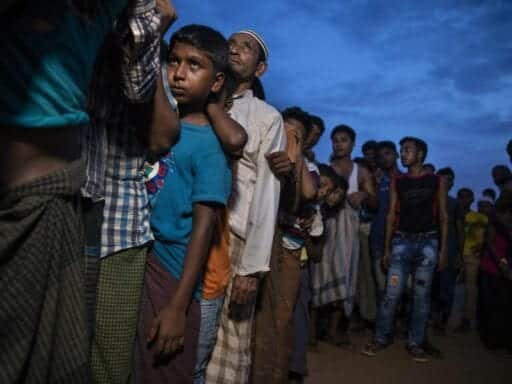The Pulitzer-prize winning pair spent more than 500 days in prison before their release on Tuesday.
Two Pulitzer-prize winning journalists were freed from a Myanmar prison on Tuesday, after spending more than a year in prison for reporting on atrocities against the country’s Rohingya Muslim minority.
The two Reuters reporters, 33-year-old Wa Lone and 29-year-old Kyaw Soe Oo, were arrested in December 2017. Myanmar authorities accused them of breaking a colonial-era law that makes it illegal to share secrets with “foreign agents.”
The reporters and their defenders said they were set up, but pair was convicted and was sentenced to seven years in prison.
But on Tuesday, President Win Myint pardoned them, along with approximately 6,000 other prisoners — which is reportedly a tradition around the country’s New Year in mid-April.
Best news ever. Reuters journalists Wa Lone and Kyaw Soe Oo have just walked free from Insein Prison in Myanmar after more than 500 days behind bars. What a glorious sight to see your smiles. pic.twitter.com/lQ2aoBvMkS
— Andrew RC Marshall (@Journotopia) May 7, 2019
Wa Lone and Kyaw Soe Oo had been investigating the killing of 10 men who were members of the persecuted Rohingya Muslim minority in a September 2017 military operation in Rakhine State. (They won a Pulitzer prize for their reporting this year.)
But in December of that year, a police officer called Wa Lone and asked him to meet. Wa Lone went, and brought Kyaw Soe Oo with him. According to Reuters:
When it was time to go, Wa Lone later said in court, Naing Lin handed him a copy of the Myanmar Alin, a state-run newspaper, rolled up with some documents inside. As the two reporters left the restaurant, they were surrounded by men in civilian clothes. “These are secret documents!” Wa Lone recalled one man shouting. A pair of handcuffs was slapped on Wa Lone’s wrists, and another on Kyaw Soe Oo’s. They were then pulled into two parked cars.
Both journalists said they didn’t even have time to look at the documents before the authorities detained them. The police officer, however, denied in court that he’d initiated the meeting or that he’d handed the men documents.
The two reporters were convicted in September and served more than 500 days in prison before they were released on Tuesday.
“I am a journalist and I am going to continue,” Wa Lone said after his release from prison in Yangon, Myanmar’s capital. “I can’t wait to go to my newsroom.”
The two journalists became a symbol for Myanmar’s broken promise of democracy
The detainment of Wa Lone and Kyaw Soe Oo received worldwide attention and criticism, and became a symbol of how democratic progress has stalled in Myanmar.
About a decade ago, Myanmar’s military-led government undertook a series of democratic reforms, including ending some censorship restrictions and releasing political prisoners, including prominent democracy and human rights advocate and Nobel Peace Prize laureate Aung San Suu Kyi. The reforms also helped bring an end to the country’s international isolation, and former US President Barack Obama even visited in 2014.
In 2015, Aung San Suu Kyi won the election, becoming the country’s de facto leader. Many saw this as a victory for civilian government, even if the military still controlled most of the government.
But it’s clear those reforms had limits. The most glaring example has been the brutal crackdown on the Rohingya minority that’s forced nearly 700,000 people to flee the country since August 2017.
The United Nations has described it as a genocide. A UN panel also alleged that top members of Myanmar’s military are responsible for human rights atrocities against the Muslim minority group. But Aung San Suu Kyi, the once-celebrated Nobel Peace Prize winner, has stayed largely silent, and at times dismissed the Rohingya crisis as “fake news.”
The international community has also condemned the crackdown on free speech during her tenure — and Wa Lone and Kyaw Soe Oo’s arrests were another sign of the country’s backsliding.
Wa Lone and Kyaw Soe Oo’s cases garnered international attention, including condemnation from the State Department and US Vice President Mike Pence. That pressure may have helped secure their eventual release, but they’re far from the only journalists who have been targeted by Myanmar’s government.
There’s been a spike of arrests in Myanmar of those critical of the government, including protesters and other journalists. At least 43 journalists have been detained since September 2018 under the current government, according to a January 2019 report by Human Rights Watch.
Secretary of State Mike Pompeo celebrated the release of the two journalists on Tuesday, but noted that other journalists have been detained. “We hope to see the release of other imprisoned journalists and greater freedom of expression,” he wrote on Twitter.
Author: Jen Kirby
Read More



